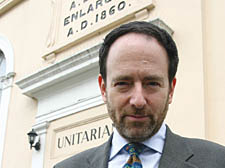|
|
 |
| |

Dr Andrew Pakula: gay couples ‘treated like second-class citizens’ |
THE CHURCH WHERE YOU CAN’T MARRY
Wedding ceremonies banned in support of gay couples’ rights
AN Islington church has become the first in Britain to ban full wedding ceremonies – until the law is changed to allow gay couples the same religious marriage rights as heterosexuals.
The move by 300-year-old Newington Green Unitarian Church comes as Islington registrar Lillian Ladele plans to appeal to an employment tribunal next month against having to conduct same-sex civil partnership ceremonies at the Town Hall.
She will argue that they are against her Christian principles.
Now, the Newington Green church’s minister, Dr Andrew Pakula, a leading critic of Ms Ladele, will take the battle for equal rights for gays and lesbians a step further.
Under the Civil Partnership Act of 2005 same-sex couples are granted the same legal rights as heterosexuals when they marry – but are not allowed a full combined religious and legal ceremony, which is allowed in parts of America and Canada.
Gay couples will normally tie the knot at a register office and can then “unofficially” receive a spiritual blessing from sympathetic church ministers. Under the law, gay and lesbian couples can celebrate marriages anywhere, as long as it is not in a statutory religious building.
Dr Pakula said: “The General Assembly of Unitarian and Free Christian Churches has called on the government to equalise the religious elements in civil partnerships.
“But our church has decided to go a step further and not participate in legal weddings until this unjust situation has changed.”
Instead of a full wedding, the church will offer civil partnership “blessings” to all couples until the law has been changed.
The church admits the loss of wedding ceremonies will mean a cut in income. The 50-strong congregation, who are said to support the move unanimously, believe losses can be offset by more informal “blessing” ceremonies.
Dr Pakula, explaining the church’s decision, added: “The Civil Partnership Act of 2005, while a major step forward, deeply wounds religious same-sex couples by denying them the right to formalise their partnerships in the heart of their own spiritual communities.
“They are being treated like second-class citizens when they are forbidden to celebrate their unions in a way that heterosexual couples take for granted.”
Dr Pakula, a relative of the late film director Alan “All the President’s Men” Pakula, said he was proud of his congregation’s stance. “Unitarian communities bring together people of different beliefs, ethnicities, ages, abilities and sexual orientations.
“Commitment to the inherent worth of all people is a core value for us.”
The church, built in 1708, can trace its roots back to a small group of Dissenters who gathered in the area in the 17th century. The oldest Unitarian church in London, it gives its creed as “freedom, reason and tolerance”.
Dr Pakula added: “The current law requires us to participate in state-mandated discrimination if we would host legal marriages. In making the decision to not offer legal weddings on our premises, we stand by our values and we say ‘no’ to bigotry, to homophobia and to discrimination against gay and lesbian couples.”
The Rev Richard Kirker, chairman of the national Gay and Lesbian Christian Movement, welcomed the move. “This is the first church I’ve heard of to have taken this step,” he said. “We’re proud that Islington is striking a blow for human rights.
“We have always argued that churches who want to marry same-sex couples should be free to do so.”
He added that the next step might be an appeal against the law to the European Court of Justice.
A Church of England spokesman said: “It has always been the teaching of the C of E that marriage – that is, faithful, committed, permanent and legally-sanctioned relationships between a man and a woman – is central to the stability and health of human society.
“In our view it continues to provide the best context for the raising of children. For that reason it warrants a special position within the social and legislative framework of our society.
“Because of the ambiguity over the nature of a commitment in a civil partnership, the House of Bishops of the Church of England decided it would not be right to produce an authorised public liturgy in connection with the registering or blessing of civil partnerships.” |
 |
|
| |
| |
| |
| |
| |
|
 |
|